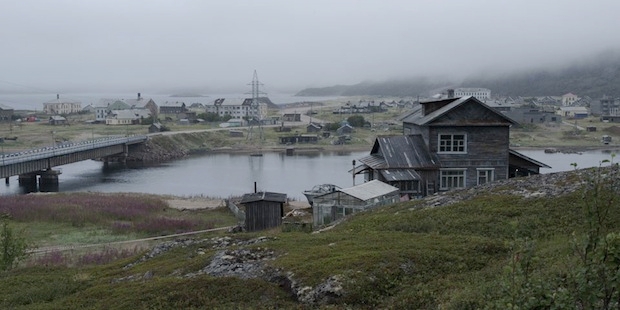The funny thing about a film like Leviathan, which many expected to win the Palme d’Or at Cannes earlier this year (it didn’t), is that suddenly an awful lot of people become experts in things they knew nothing about before reading the press notes. Some people may be familiar with the Bible’s Book of Job, of course, and with Leviathan, the sea monster used to demonstrate to Job the futility of questioning God. Several may even have read Thomas Hobbes’s tome of the same name about conceding power to the state. A few may genuinely be well-versed in both. A big pat on the back to them. They read a lot.
Realistically, most viewers of Andrey Zvyagintsev’s latest work probably won’t know much about either title allusion, but that won’t stop you hearing a lot about social contract theory this and theological allegories that. It’s enough to put plenty of serious film-lovers off. Over two hours decoding complex scriptural references via subtitles? No thanks.
Which is a great shame, because Leviathan is a hoot, a tragedy and a masterpiece, with or without a theology degree. I knew nothing about Job or Hobbes when I saw Leviathan – and I loved it. This is a bold and brassy piece of work, one that sticks two fingers up to the Kremlin and does so with style. Its plot, desperate and darkly funny, stands strong without any philosophical foreknowledge, because it taps into something everyone loves to hate – impenetrable bureaucracy and the corruption of power – and looks at it in the place where everyone assumes this sort of thing is worst: Russia.
Our doomed protagonist Kolya is a nice guy, a car mechanic living in an isolated spot on the stunning, windswept shores of the Barents Sea in northern Russia. He inherited the land, built his home himself, and has now been hit with a compulsory purchase order from an unscrupulous mayor who apparently wants to build his luxury holiday dacha there. Roman Madyanov puts in a marvellous performance as the repulsive mayor Vadim, cocksure and pasty-faced, in cahoots with an icy orthodox priest, whose own demons will be revealed in due course.
Kolya invites his old army buddy Dmitri, now a hotshot lawyer from Moscow, to come stay while they launch an appeal against the order – but he doesn’t seem to have spotted the looks of longing exchanged between his beautiful young wife Lilya (Elena Lyadova) and Dmitri, or taken much notice of quite how resentful his teenage son Roma is of Lilya. There is a lot bubbling beneath the surface of this film, and many seminal events take place tantalisingly off screen, leaving the audience to reach its own conclusion. It doesn’t matter so much what the truth is as what the state decides.
All of the ruling classes get a bashing here – the government, the legal system, the church – and it’s done alternately with a light touch and with thundering clarity. Early on we see a picture of Putin hanging cheekily in the background overseeing proceedings in Vadim’s office; later Kolya and his pals go shooting (armed with plenty of vodka, naturally) and use portraits of past presidents for target practice. The film skips neatly between droll satire and loud comedy.
It’s no surprise that the film has only just managed to secure a general release in its own country, after an initial refusal on the grounds that it was too sweary. This is both a beautifully filmed small-town domestic drama and a large-scale political protest with meaty themes and thinly-veiled anger at real regimes. It is also hotly tipped for a foreign language Oscar next year. It will be interesting to see the reception it gets in its homeland.






Comments